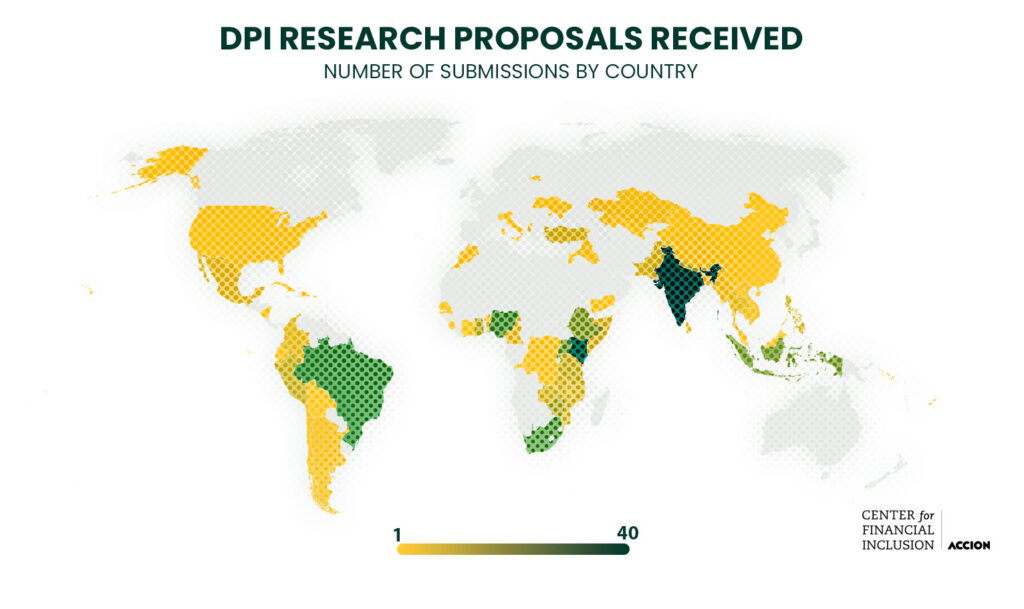Person
Since the Global DPI Insights Community launched in May 2025, our goal has been to support rigorous, grounded research and facilitate constructive dialogue around the complex and context-dependent forces shaping the design and governance of digital public infrastructure (DPI). Through our DPI-centered work at the Center for Financial Inclusion (CFI), it became clear that there was an urgent need for a collaborative platform where researchers, technologists, policymakers, and civil society actors could come together to build evidence, challenge assumptions, and guide the future of inclusive digital systems.
We hoped the Global DPI Insights Community would resonate when we launched the first open call for research proposals. In fact, the response was nothing short of extraordinary. With over 300 applications spanning 67 countries, the enthusiasm and diversity of perspectives demonstrated by the proposals reaffirm the urgency and global relevance of this work. From questions around governance and sustainability to accessibility and how the informal sector interacts with DPI, the research submissions surfaced critical tensions and opportunities at the heart of current DPI innovation.

We are deeply grateful to everyone who submitted a proposal. Your ideas, energy, and desire to contribute toward a strong evidence base for digital infrastructure are the lifeblood of this community. This is just the beginning—a first round of research funding—and we’re excited to grow the network of thinkers and doers who are helping define what DPI can and should be.
We congratulate the six research proposals who have been selected as finalists to receive seed funding as part of the Global DPI Insights Community. They are:
- Amarante Consulting (Geographical Focus: Ethiopia)
- How can Ethiopia’s PKI and IPS governance models evolve to better serve citizens by building consumer trust, enhancing protection, and fostering fair competition?
- CybAfrique (Geographical Focus: Multi-Country across Africa)
- When DPIs Fail: Human Impact, Data Governance Lapses, and Public Trust in Africa’s Digital Infrastructure
- Digital Infra Ghana Limited and the University of Health and Allied Sciences (Geographical Focus: Ghana)
- Enhancing Digital Trust and Recourse Mechanisms in Ghana’s Emerging DPI Landscape: A Focus on Vulnerable Populations
- Fenix Digital (Geographical Focus: Global)
- Financial Sustainability: Lessons on Integrating DPI for the Future
- Fundación Capital (Geographical Focus: Colombia)
- Digital Bridges for Financial Inclusion: The Role of Public Digital Infrastructure in Empowering Migrant Women and Facilitating Remittances in Colombia
- IILM University (Geographical Focus: India)
- Understanding UPI Scams and the Digital Payment Experience of Elderly Users: A Study Focused on Delhi
For those interested in applying, a second round of funding will be announced in early 2026. Stay tuned.
In the process of reviewing each and every application, we learned a great deal about how people across the globe are thinking about DPI. We share three of these insights below.
Africa is at a crossroads with DPI
While countries across all regions are considering whether and how to adopt DPI, Africa stands out as a continent facing these decisions in the near term. Just over half of the applications we received were from Sub-Saharan Africa. While this large volume of applications may also have to do with launching the community in South Africa, the critical need for evidence as a basis for informed policy decisions about DPI development and implementation in the region is clear.
Many African countries are considering how the experiences of India and Brazil—early adopters of DPI—translate to local contexts. At the same time, African countries are looking for learnings from other African DPI initiatives. They are attempting to navigate several uncharted tradeoffs and policy choices, such as how to balance long-term financial sustainability with the security and safety of systems. These decisions are as important as they are difficult, and the need for evidence to inform them has never been clearer.
DPI still has a definition problem
Several applications centered on digital transformation of businesses, access to internet connectivity, stock exchanges, and other themes adjacent to DPI. These applications were thoughtful but out of step with our definition of DPI, which includes shared digital systems focusing on ID, payments, and data exchange rather than physical infrastructure or more traditional capital markets infrastructure.
Challenges in reaching a common lexicon are to be expected in a nascent and rapidly evolving field like DPI. While the distinction we’re making may seem semantic—after all, internet connectivity and digitally savvy businesses enable DPI adoption—a shared definition of DPI is important. A common language is necessary so that policy discussions can move forward with nothing lost in translation, especially when debate is on a global scale.
The interaction between digital public infrastructure and digital private infrastructure remains a challenge
A striking theme that emerged from the proposals was the complex and evolving relationship between DPI and digital private infrastructure. For example, in countries with widely adopted payments systems, like mobile money in Kenya, how can the public sector add value without entrenching monopolies or crowding out private investment? As private social media platforms become crucial channels for consumer complaints and information, how should regulators and policymakers adapt?
The interaction between public and private systems raises several critical questions: Where does infrastructure end and service provision begin? How should interfaces between public and private actors be governed, and by whom? Many applications proposed investigating guardrails that ensure DPI remains open, interoperable, and supporting market competition. As DPI systems mature, navigating this boundary between private and public systems will be essential to ensuring both public value and a thriving digital ecosystem.
Acknowledgements
As we start the next phase of our work at the Global DPI Insights Community, we want to extend our gratitude to our founding funder Mastercard Center for Inclusive Growth and anchor technical experts, including the Cambridge Centre for Alternative Finance, GSMA, and the Universal DPI Safeguards Initiative at the UN’s Office of Emerging and Digital Technologies, in addition to Founder & CEO of Integral Solutions, David Porteous as an individual technical partner bringing a wealth of expertise and thought leadership at the forefront of DPI. The success of this initiative depends on the diversity of its contributors, including a broad network of researchers, academics, policymakers, technologists, civil society policymakers, and private sector actors.
To everyone who submitted a proposal—thank you once again. Your ideas, questions, and energy have helped surface critical themes that will guide our collective learning. We welcome your active participation in the community and are looking forward to learning with—and from—you in the months ahead.











